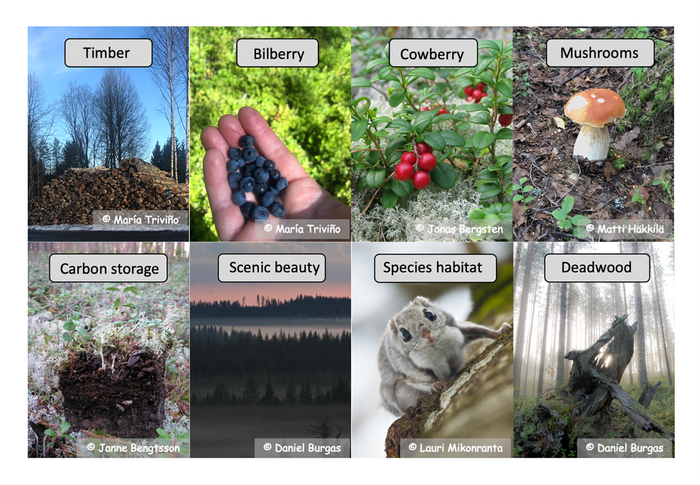Forests contribute to human well-being by providing a wide variety of ecosystem services to the society. The boreal biome is experiencing rapid changes both with the highest rates of warming on the planet and continued increase in demand for forest products. It is a real challenge to manage and adapt boreal forests to future warmer conditions and growing demands of forest products. A new study published in Global Change Biology explores the relative importance of forest management and climate change on the supply of ecosystem services and if the importance of these two drivers varies among biogeographical zones.

Credit: University of Jyväskylä
Forests contribute to human well-being by providing a wide variety of ecosystem services to the society. The boreal biome is experiencing rapid changes both with the highest rates of warming on the planet and continued increase in demand for forest products. It is a real challenge to manage and adapt boreal forests to future warmer conditions and growing demands of forest products. A new study published in Global Change Biology explores the relative importance of forest management and climate change on the supply of ecosystem services and if the importance of these two drivers varies among biogeographical zones.
The study, led by researchers from the University of Jyväskylä, used forest growth simulations to project forest dynamics in Finland 100 years into the future (2016–2116). This study estimated the potential supply of eight forest ecosystem services given seven management regimes and four climate change scenarios.
According to the results, the effects of management on the future supply of forest ecosystem services were, on average, 11 times higher than the effects of climate change across all services, but greatly differed among them (from 0.53 to 24 times higher for timber production and cowberry yield, respectively). Intensive forest management for timber production will have an overall negative effect on the ecosystem services provision (in five out of seven of the non-timber services evaluated), especially for forest biodiversity. On the contrary, climate change will have an overall positive effect on the ecosystem services provision (in six out of eight of the services evaluated). Climate change effects will increase with greenhouse gas concentration and be larger in northern Finland.
Need for careful forest management planning in the context of climate change
The study highlights that to maximize the future supply of ecosystem services, forest management planning should account for the biogeographic diversity of boreal forest. The importance of forest management and climate change substantially differed among biogeographical zones within Finland. The effects of climate change were 1.6 times higher in northern Finland than in southern Finland, whereas the effects of management were the opposite – they were three times higher in the south compared to the north.
“Our results suggest that climate change mitigation measures are particularly suited for northern Finland, as climate change will have a more dramatic impact in this region. On the other hand, southern Finland has been subject to intensive management for timber production, and if timber-oriented management continues there will negative impacts to non-timber ecosystem services. Thus, if the society wishes to retain high level of forest multifunctionality the focus should be on increasing forest protection and the share of closer-to-nature management strategies”, says Researcher María Triviño.
The results also show that no single management scenario maximizes the provision of all services. For example, the provision of carbon storage, scenic beauty, deadwood volumes and habitat availability for species were maximized under the set aside scenario, but timber, berries and mushroom provision were maximized when other management regimes were considered (i.e., continuous forest cover forestry and management without thinning but with short rotation). Professor Mikko Mönkkönen points out this key message to decision-makers: “There is a need to diversify forest management across all Finnish forests, for example, apply more continuous cover forestry, because diversity of management types promotes the diversity of ecosystem services.”
“There is lot to learn at the European scale from these results”, says Researcher Alejandra Morán-Ordoñez from Spain, “as they clearly point out the importance of considering regional variation in the effects of climate change and management when putting the recently approved EU forest strategy in practice”.
The study is part of the project “Spatial dynamics of ecosystem services and biodiversity hotspots in boreal forests” funded by Kone foundation.
Journal
Global Change Biology
DOI
10.1111/gcb.16566
Method of Research
Computational simulation/modeling
Subject of Research
Not applicable
Article Title
Future supply of boreal forest ecosystem services is driven by management rather than by climate change
Article Publication Date
19-Dec-2022




